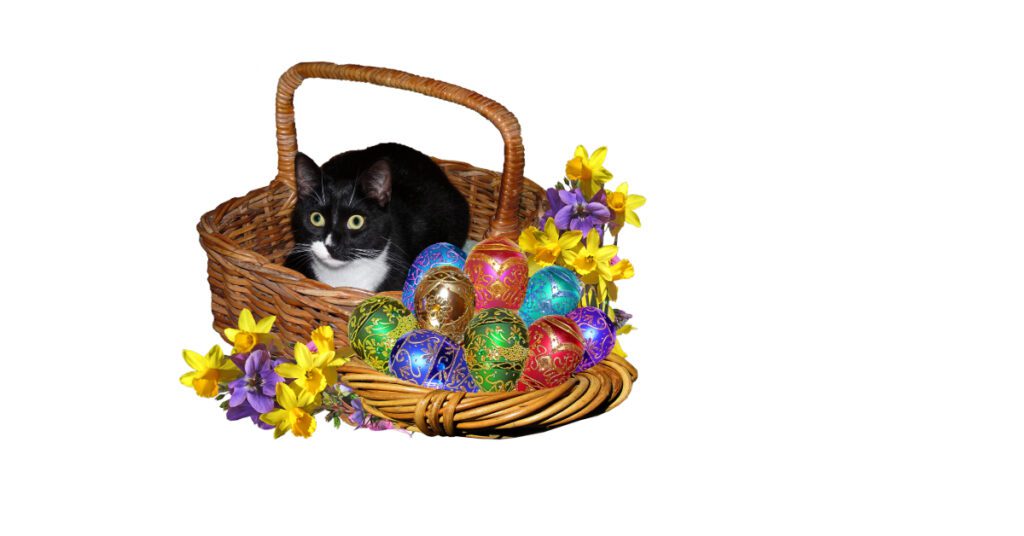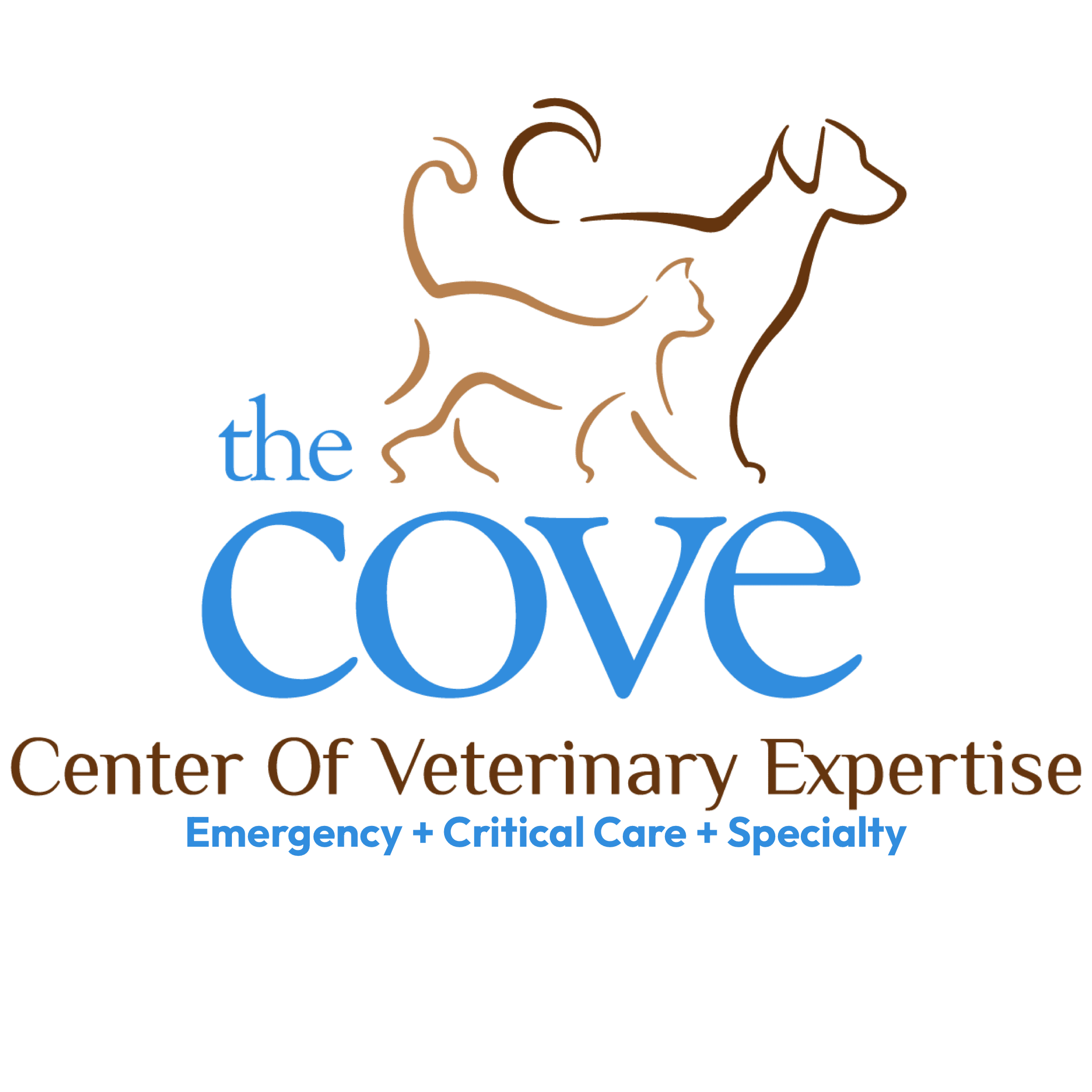The Easter bunny is on his way! From the Peeps and Cadbury Eggs to the pastels and stuffed rabbits, Easter is a time of fun, family, and the welcoming of spring. For the team at The COVE, this time of year also means helping pet families understand how to have a safer, happier Easter for fur friends.
Here are some tips and recommendations to make this year’s Easter the most eggs-cellent of all!
Those Inviting Easter Baskets
Waking up to a colorful array of treats and toys is something most kids don’t want to miss out on. You can be sure Rover is thinking the same thing. But the contents of those festive baskets can be dangerous to pets.
Be sure to keep all of the following items away from your pets.
- Chocolate contains caffeine and theobromine. Both cause toxicity in pets. Symptoms include increased thirst, panting, vomiting, diarrhea, an accelerated heart rate, tremors, and seizures.
- Xylitol, a sugar substitute found in candies, gum, and other confections, including some brands of peanut butter, is extremely toxic and can cause dangerous drops in blood sugar level, seizures, and liver failure.
- Macadamia nuts, often found in chocolate, can cause vomiting, loss of coordination, weakness, increased internal temperature, and depression, if ingested.
- Synthetic grass is very tempting to cats and, if eaten, can lead to intestinal obstruction. To help keep your pets safe, try using paper grass to adorn your baskets and holiday decorations.
- Foil wrappers can cause an obstruction in the gastrointestinal (GI) tract.
- Small plastic toys can be choked on or can lead to an obstruction.
When the Easter basket isn’t in use, stash it somewhere out of reach of your four-leggeds, and supervise whenever the treats are being distributed to and eaten by children.
Poisonous Plants
Flower displays are popular during Easter. It’s fun to adorn your mantel dining room table, and other areas of the home and yard with spring foliage and blooms. But be aware that the following plants are toxic to pets.
- Lilies are highly toxic to cats and can cause death, even when just a few leaves are eaten. Clinical signs of lily toxicity may include drooling, foaming and pawing at the mouth, and vomiting.
- Hyacinth and tulips belong to the Liliaceae family and contain allergenic lactones that cause toxicity in dogs and cats. The signs of toxicity include increased drooling, vomiting, diarrhea, and inflammation of the mouth and throat.
- Ingestion of daffodils (any part of the plant) can lead to nausea, vomiting, diarrhea, and abdominal pain.
- Lily of the Valley is very dangerous to pets, causing a slow and irregular pulse, seizures, and heart arrhythmia if eaten.
- Crocus’ toxicity can range from mild to severe and can cause vomiting, gastrointestinal bleeding, bloody diarrhea, liver and kidney damage, respiratory failure, and seizure.

Easter Egg Hunts
Easter egg hunts are a time-honored tradition that can be a joy for the whole family. For a pet-safe hunt, make sure to map out where you place every egg, so that when the festivities are over you can carefully check that they have all been found. Eggs that are left will rot and become full of bacteria and cause your pet to become very sick if eaten.
Eggs also contain salmonella when undercooked or raw. This can cause excessive vomiting and diarrhea that can lead to dehydration. Choose nontoxic dyes that are friendly to both kids and pets, and give your dog a slice or two if you wish (provided it is fully cooked).
The Easter Table
While you are enjoying the bounty of spring, be aware of other goodies that are no-no’s for pets because they are toxic or can cause other problems.
- Alcohol is toxic to animals, even in small amounts, and can cause stupor, decreased respiration and heart rate, and vomiting.
- Rich, fatty foods can cause your pet to become ill or can lead to pancreatitis, a severe inflammation of the pancreas.
- Onions and garlic can cause your pet to become ill, including vomiting and diarrhea. In larger amounts, a serious condition called hemolytic anemia can occur.
- Grapes and raisins can cause acute kidney failure, even if your dog has eaten only a minimal amount.
- Baker’s chocolate and cocoa, like other chocolate treats, can cause seizure and cardiac arrest.
- Bones can splinter or cause choking.
If you know that your pet has ingested something suspicious, please call your veterinarian, or go to the nearest animal emergency hospital. It is also important to have the ASPCA Animal Poison Control Center 24-hour emergency poison hotline number accessible: it’s 888-426-4435. Or download their mobile app. When calling, it will be helpful if you can give the name of the item that was ingested, or have the ingredients label to hand, and the amount you think your pet ate. Time is of the essence in cases of poisoning. Act quickly.
We hope you find these tips helpful as you are planning your holiday with your furry loved one. From our family to yours, we wish you a Hoppy Easter!
The COVE is OPEN on Easter and Every Holiday
If you are here in the Suffolk/Norfolk region, you can trust in the care of our Emergency Department, led by Jacqueline Nobles, DVM, DACVECC, a board-certified specialist in emergency and critical care. The COVE is open 24 hours a day, 365 days a year. We are located at 6550 Hampton Roads Pkwy, #113, Suffolk, VA. We welcome your call anytime, day or night, at 757-935-9111.
About Us
The COVE’s veterinarians and staff wholeheartedly embrace the core values of community, collaboration, commitment, compassion, and integrity. This focus ensures that pets, the people who love them, and their primary care veterinarians have as positive and affirming a healthcare experience as possible, regardless of the circumstances that bring us all together.
